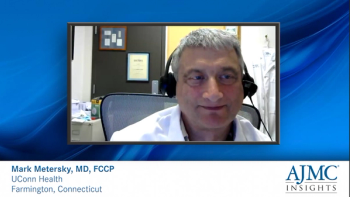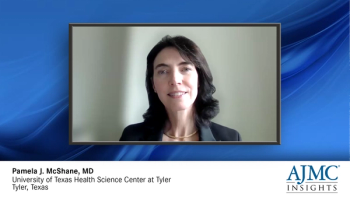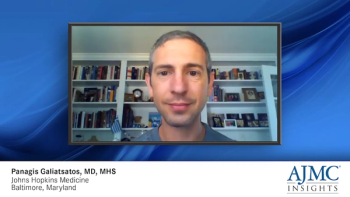
Mark Metersky, MD, FCCP, illustrates the pathology of bronchiectasis.

Mark Metersky, MD, FCCP, illustrates the pathology of bronchiectasis.

Trajectory of patient outcomes for those diagnosed with bronchiectasis is explored by Dr Metersky.

Notable signs and symptoms distinguishing bronchiectasis from other pulmonary disease states are discussed.

A medical expert highlights the impact of bronchiectasis diagnosis on quality of life for patients and their caregivers.

Dr Metersky provides an overview of current treatment strategies for managing patients diagnosed with bronchiectasis.

The critical impact of respiratory and physical therapists in the management of bronchiectasis is emphasized.

Dr Metersky provides his closing thoughts, highlighting key points of emphasis surrounding bronchiectasis care and the future of its treatment landscape.

Pamela J. McShane, MD, explores the clinical manifestations of bronchiectasis, including productive chronic cough, hemoptysis, and recurrent respiratory infections, while emphasizing the importance of CT scans in revealing improper airway narrowing and addressing the misdiagnosis of COPD and asthma.

Pamela J. McShane, MD, discusses the long-term outcome of patients with bronchiectasis and emphasizes the crucial role of radiographic imaging in diagnosing the disease.

A medical professional explores the management of bronchiectasis exacerbations, detailing the significance of sputum color, the potential for hemoptysis, and the exacerbation of comorbidities such as COPD and asthma.

A medical professional addresses the social aspects of bronchiectasis, emphasizing patients' embarrassment due to productive coughing in public spaces like grocery stores and churches, as well as the psychological challenges of planning travel and vacations due to the unpredictability of exacerbations, which can lead to social isolation.

Pamela J. McShane, MD, explains her approach to diagnosing the underlying cause of bronchiectasis, which includes identifying cystic fibrosis in older patients, and emphasizes the importance of helping patients lead a normal life while managing their condition.

A medical expert discusses the various types of bacteria and fungi that can grow in the lungs and sputum of bronchiectasis patients, such as Pseudomonas aeruginosa, emphasizing the importance of an individualized approach to treatment, and notes that while fungal cultures may be positive, they may not always be clinically significant.

An exploration of idiopathic bronchiectasis, emphasizing the importance of patient participation in clinical trials to advance knowledge and treatment options for this condition, along with concluding thoughts and key takeaways on the management and understanding of bronchiectasis.

Panagis Galiatsatos, MD, MHS, provides an overview of clinical presentations that prompt consideration of bronchiectasis in the differential diagnosis.

A pulmonary and critical care medicine physician discusses how bronchiectasis compares with other chronic respiratory disorders, highlighting the differing signs and symptoms.

An expert on bronchiectasis describes the extensive impact of exacerbations on patients’ lives and the health care system.

Panagis Galiatsatos, MD, MHS, provides clinical insights on resources and factors that inform the treatment of patients with bronchiectasis.

A pulmonary specialist shares his approach to treating patients with bronchiectasis, highlighting gaps in knowledge that impact management practices.

Looking to the future of bronchiectasis treatment, Panagis Galiatsatos, MD, MHS, outlines challenges in the current therapeutic landscape and discusses ways to potentially improve care.

259 Prospect Plains Rd, Bldg H
Cranbury, NJ 08512
© 2025 MJH Life Sciences®
All rights reserved.
